![IMAG2626[1]](https://awaredonline.wordpress.com/wp-content/uploads/2015/12/imag26261.jpg?w=656)
In a lecture headed by award-winning writer and University of the Philippines professor Jun Cruz Reyes, he likened Gregorio del Pilar’s story and history in itself to a love story and a love song.
The talk was held at Dambanang Marcelo H. del Pilar in Bulakan, Bulacan on Saturday, November 14, in commemoration of del Pilar’s 140th birthday celebration with the theme “Hen. Gregorio H. del PIlar: Huwaran ng Kabataan, Gabay ng Nagkakaisang Bayan.”
At the beginning of his speech, he said that, “Little histories independent of each other makes little or no sense. But when weaved together into a tapestry, it becomes a tale which makes perfect sense.” He noted that when some studies history, the student must take note of the things he can never see, just like love.
So as to “humanize” a national hero, Reyes narrated the life of General Gregorio del Pilar not as bold general, but as a lover. He said that Gregorio del Pilar had a lover named Dolores.
“When del Pilar died, his clothes were stripped off. The only thing left was that handkerchief with an embroided letter ‘D’ in it, which covers his chest. It signifies that del Pilar died while loving a woman.” After that, he joked about the story being similar to television soap operas.
Later, he discussed about kundimans or love songs native in the Philippines which were written by Katipuneros and revolutionaries themselves. He said that even though they love the country and are willing to fight for it, they also have their loved ones whom they care about. Those sweet love songs were written with a background full of bloodshed and despair.
“Every generation has its own question mark. Every generation has lovers. But what differentiates a generation from another generation is the way they give meaning to things. To them, the meaning of love is to fight for their loved ones and for their country. They do not wish for financial gain, but for the people to live in peace,” he concluded with a challenge to the youth to find the question mark and the meaning of love in this generation.
Author: eccentriclass
Environmental Photographs Around Malolos, Bulacan
![IMAG2923[1]](https://awaredonline.wordpress.com/wp-content/uploads/2015/12/imag29231.jpg?w=656)
![IMAG2732[1].jpg](https://awaredonline.wordpress.com/wp-content/uploads/2015/12/imag27321.jpg?w=656)
![IMAG2739[1]](https://awaredonline.wordpress.com/wp-content/uploads/2015/12/imag27391.jpg?w=656)
Clinical Depression and Mental Healthcare in the Philippines
Aldub and Pastillas Girl vs Lumad Killings and Syrian War

Let us not be distracted. There are issues in the world we must be aware of, and as responsible citizens of the earth, we must do something about them.
Okay, folks. I am not an elitist who wants to feel superior. I admit that I sometimes watch eat Bulaga’s Kalyeserye to have a few good laughs. But I wonder why many people seem to be more obsessed with love teams.
What about the ills and wars happening in the society?
The popular love team of Maine Mendoza a.k.a Yaya DUB and Alden Richards called “Aldub” were already making rounds on social media ever since 2 months ago when they were established. And recently, they made a history on social media after netizens posted 12 million tweets about their most awaited date.
Another trending topic these past few days is about the so-called battle between Yaya DUB (Maine Mendoza’s personality in Kayleserye) and Showtime’s Pastillas Girl. Netizens spend their precious arguing who is better among the two.
Yet, why do issues such as the Syrian war and Lumad killings seems to be overlooked?
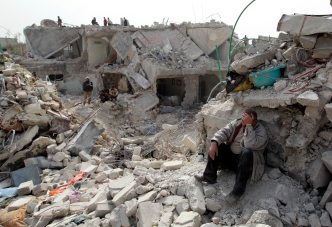
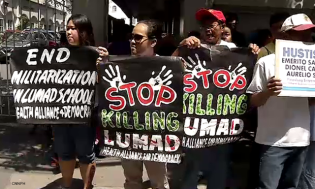
As a netizen and an active Facebook user, this is what I’ve noticed: People are more obsessed with arguing about Yaya DUB and Pastillas Girl instead of talking about these issues.
Let me ask a question: Is this what morally and socially responsible citizens do?
Ethical Tips in Interviewing
Sources are the water that brings life into our news articles. Without them, where will we get the facts?
The most common way we journalists do to obtain facts is through interviewing key people needed for our story. Generally, there are three types of interviewing: the appointment interview (a scheduled one in a certain time and place), the ambush interview (typically happens on a closed coverage wherein you approach the key person(s) directly) and online interview (happens on social media, usually in private messages).
However, interviewing seems to be a daunting task for amateurs. They are the ones prone to experiencing shyness and intimidation, especially when interviewing public figures. Other than that, they are also more likely to act unethically while doing the job.
How do amateurs get past through the barrier towards professionalism? Here are some tips discussed during our News Writing class, headed by our professor who’s a correspondent of a prominent national daily.
- If you are to resort for a scheduled interview, let your source decide which place are you going to meet and what time (unless you have your own reasons).
- If your company has a press I.D., wear it. (Probably not applicable for citizen journalists.) People doesn’t have to guess who the heck are you.
- Be courteous. And approach the source in a humble manner. Greet them and introduce yourself. And ask them first if it’s okay to interview them.
- For a one-on-one interview, maintain eye contact with the source to him/her know that you are listening. Don’t forget to smile
- Ask the source first if he/she wishes to be anonymous or not.
- After the interview, thank them and do whatever you can to express your gratitude.
Types of Commentators
Let’s admit it- opinions of the commentators themselves are more interesting than the news itself. There’s nothing more entertaining to see both sides of the spectrum clashing against each other, tearing every argument which dares to debunk each premise, until every question is answered or new points of debate arise from that issue. Sometimes, it’s a black and white argument. Sometimes, there are certain shades of grey. Whatever color it is, it doesn’t change the fact that most of these debates are about humanity and the human’s internal and external struggles, which makes the forums interesting and relevant to us.
Here are the types of commentators you usually see on news sites):
- Smart-ass essayist
This commentator writes VERY VERY LONG comments about how right he is or how wrong the opposing side is. Watch out for the overly deep usage of the English language, you may need the aid of Mr. Dictionary. He usually points out every argument of the opposing side and tears them one by one, with a grin of satisfaction written on his face of course.
2. The Jester
Sometimes, he makes perfect sense. Sometimes, he’s racist. Whatever. All I know is reading his comments make me laugh (with a little bit of guilt on morally questionable jokes, though).
Subtype 1: He’s pretty much an essayist like our smart ass friend, except the he wasn’t writing essays at all. Maybe an unfinished introductory paragraph?
Subtype 2: The photobomber (either his own work or someone else’s)
3. The Chronicler
Prepare to wipe your tears, as he may win your sympathy. He usually shares what he experienced in light of the recent issue, which may inspire people or annoy them because of something. Oh come on! Even if he just exposed a part of his life, we find him relatable after all.
What about you? What are the common types of commentators you see online? Share your experience with us.
Marcelo H. del Pilar and Young Journalists
On Saturday, August 29, the National Press Club along with the Bulacan Press Club organized a forum lecture about Marcelo H. del Pilar and his involvement with the Katipunan. The event was held at Gregorio del Pilar Elementary School and attended by BulSU’s journalism students and media people from around Luzon. They key speaker was King Cortez, a historian who studied about the said hero and came to a conclusion that Tata Celo -the hero’s nickname- is the mastermind behind the Katipunan, contrary to the popular belief that it was the idea of Andres Bonifacio. But ultimately, the lecture also talked about del Pilar being a revolutionary journalist whose writings influenced the hearts and minds of the Filipinos of his generation.
In the lecture, Cortez used century-old documents to prove that it was del Pilar who established the K.K.K. It is noteworthy to mention that his objective in establishing the Katipunan and writing in La Solidaridad ultimately has one intention- to set the Philippines free from the colonial rule of the Spaniards. His initial plan was to use peaceful means, but if the Spanish government refuses, revolution will be the way. In others words, they are connected with each other. This is so contrary to what was taught to us when we were in high school. We grew up thinking that the Katipuneros and the Ilustrados are diametrically different, and have no connections with each other. Cortez and his team lamented how underrated del Pilar is compared to his peers. He stated that no other hero can match up with the supreme sacrifices did for the country.
Cortez and the journalists from all over Luzon also organized a media camp on the same day in which they signed petition to declare August 30, the birthday of the national hero, to be a national holiday which is called the National Press Freedom Day.
Gat Marcelo H. del Pilar is not only a skilled lawyer and the father of Philippine Masonry, but also the father of Philippine journalism. If there’s any patron saint who should serve as a model for journalists of all generations, it should be him.
In my exclusive interview with Joel Egco, president of the National Press Club and a journalist from The Manila Times, he enumerated the qualities of Gat Marcelo H. del Pilar each journalist must copy. Here is the full transcription of the interview:
Me: “Ano po sa tingin niyo ‘yung qualities ni Gat. Marcel H. del Pilar na dapat pong kopyahin namin bilang journalism students?” [What do you think are the qualities of the late Gat Marcelo H. del Pilar that we must copy as journalism students?]
“Ngayon, nalaman natin na he was not just a reformist. He was a revolutionary.’Yan ang bago nating tawag sa kanya. Kasi mas nakilala siyang reformist e. Kasi hindi siya actually nakapunta rito to participate in the Revolution [dito sa Pilipinas]. But he was about to. Unfortunately, namatay siya [sa Madrid, Spain]. So pauwi na siya no’n. So, nabanggit nga ni King na naging key siya sa formation ng Katipunan. That’s why si Deodato Arellano, ‘yong bayaw niya naging presidente no’ng una. So, si Deodato, hindi gagalaw nang hindi alam ni Gat Plaridel.”
[Today, we learned that he was not just a reformist. He was a revolutionary. That’s how we identify him now; although he was more known as a reformist. The truth of the is, he wasn’t able to participate in the Revolution here in the Philippines. But he was about to. Unfortunately, he died in Madrid, Spain. He was about to go home when it happened. So, it was stated earlier by King that he was the key to the formation of the Katipunan. That’s why Deodato Arella became its first president. Deodato will not move unless del Pilar knows about it.]
“So, ang mga qualities na ‘yon, of course, ‘yung perseverance niya na to achieve independence at all costs. He was pretending to be a reformist when actually, he’s part of the Revolution pala. Magaling siyang mag-isip. May diskarte siya. Hindi siya nakatutok sa isang pamamaraan to achieve [his] particular goal which is independence. Kalayaan. He wanted his nation to be free. Kaya ang [tawag] sa kanya ngayon [ay] Ama ng Bansa. [Iyon] ang bago nating tawag sa kanya. And, of course, he is a professional, a very professional journalist. An editor, publisher, reporter, siya na lahat e. And, hindi niya binenta ‘yung profession niya [at] ‘yung kanyang paniniwala kapalit ng rangya. That’s why he died a pauper in pursuit of his ideals. ‘Yon ang pinakamagandang gayahin natin sa kanya. Very humble ang buhay niya. Yet, ang kanyang ambisyon ay napakalaki para sa buong bansa.
[As for the qualities, [it’s noteworthy to mention] his perseverance to achieve independence at all costs. He was pretending to be a reformist when actually, he’s part of the Revolution. He’s a good thinker and a good strategist. He didn’t focus on a sole means to achieve his goal which is independence. Freedom. He wanted his nation to be free. That’s why we now call him the Father of the Nation. That’s the new title we should give to him. And, of course, he is a professional, a very professional journalist. An editor, publisher, reporter; he has it all. And ultimately, he didn’t sell his profession and his beliefs in exchange of wealth. That’s why he died a pauper in pursuit of his ideals. That’s his most beautiful trait that we should copy. He lived a very humble life. Yet, his ambition for the whole country is very big.]
Citizen Journalist Speaks: My Personal Opinion about the Ombudsman Verdict on 9 BulSU Officials
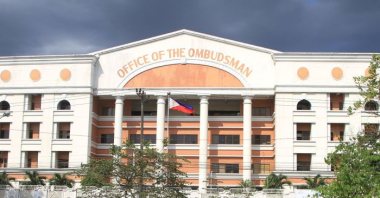
As a student who should be aware of my surroundings, I feel obliged to voice out my opinion about the recent issue my university faces. Anyway, this should be the spirit of every citizen journalist, whether a mere commentator or someone who actually reports- to have a keen eye on anything which will affect the people.
A year ago, on August 19, seven Tourism students from Bulacan State University passed away after being swept away by strong river currents in the Madlum River at San Miguel, Bulacan. They were on an exposure trip to Biak na Bato, and students claimed that they would not take the final exam if they joined the trip and wrote a report instead. Rains were heavy during that day, which caused waters to accumulate in the upstream and downpour causing a flash flood. Despite warnings from another student tour guide about the weather, the group still pushed through and continued the trip.

Nine Bulacan State University officials (Mariano de Jesus, university president; Nicanor de la Rama, vice president of student affairs; Nerisa Viola, dean of the College of Home Economics ; Angelina Cinco, assistant dean; professors Mary Jane Lopez and Angelyn Dy Tioco; and instructors Leslie Garcia, Rossette Tanwangco and Reynita del Fonso) were accused of grave misconduct and gross neglect of duty after failing to observe the regulations set by Commission of Higher Education (CHED) and the Bulacan Provincial Ordinance.
The Office of the Ombudsman dismissed all of them from public service, cancelled their eligibility, stripped off of their retirement benefits, disqualified them from holding public office and from taking the civil service exam.
Tragedy happens, whether prepared or not. However, preparedness is observed to lessen the repercussions and to avoid tragedies as much as possible. Regulations were set up because of these matters, and we must, in all obligation, comply with them.
However, it cannot be denied that there’s negligence on behalf of the officials. They failed to get an endorsement from CHED which requires them to submit a risk assessment plan. In this plan, teachers and organizers will evaluate the risks which may occur during the trip and what measures must be done to counter it. Had they complied with it, they wouldn’t have to face administrative charges. The waivers signed by the parents were not enough, judging from this criterion.
Other types of negligence that occurred is the way the team still went to the site despite the bad weather. We know all too well that a bad weather plus a tricky trekking track is a recipe for disaster. Also, the tour guides are lacking. There should have been more experienced tour guides, considering how dangerous the area can be. And ultimately, the three teachers who were supposed to guide the students were left at the starting point to do videoke. Like what heck! Aren’t the teachers themselves supposed to be front runners in watching them?
Okay, the Ombudsman declared its verdict. Yes, there’s negligence, and something must be done.
However, BSU students are venting out their dismay about the decision of the Ombudsman on Facebook. They say that even though there’s negligence, the officials, especially the university president and the dean of student affairs, should not be stripped off of their retirement benefits as they worked for so many years to serve the university and its students. They also say that the level of involvement of each official must be weighed with the gravity of the charges.
My stance is: give the rightful punishment to each one of them. Yes, this issue cannot be overlooked because lives were at stake, but I personally believe that the punishment is too much. I do not intend to pick a side here. I only wish to here to balance the views and to reveal what I believe can be done for the greater good of both sides, and of everyone.
If there’s anyone who should be rightfully punished most, it’s the travel agency which pushed through the trip despite potential risks. Also, they should have coordinated with the barangay officials to check the rain and flow of water. This could have prevented the tragedy. Next are the teachers who only chose to have fun instead of looking after their students.
As for the BulSU officials, I do not have a problem with them being dismissed even if they didn’t wished for it to happen. But I cannot agree with their retirement benefits being withdrawn. They worked hard for their positions for so many years, and have contributed to the academic community immensely. In fact, I don’t even want to agree with the idea of dismissal at all. Why does the pillars of our university have to suffer gravely? Removing their source of income and cutting off their career is almost tantamount to killing the breathing. Also, not all of them have the same level of involvement to the tragedy. Some of them just happened to be related, albeit to a little degree, thus held liable.
I hope that next time, everyone will definitely comply with the law. After all, everyone of us are victims here, not only the seven students who died, not only the families of the departed, not only the teachers who didn’t wish for this, but also us who needs exposure trips to learn a lot.
Citizen Journalist Speaks: My Personal Opinion about the Ombudsman Verdict on 9 BulSU Officials

As a student who should be aware of my surroundings, I feel obliged to voice out my opinion about the recent issue my university faces. Anyway, this should be the spirit of every citizen journalist, whether a mere commentator or someone who actually reports- to have a keen eye on anything which will affect the people.
A year ago, on August 19, seven Tourism students from Bulacan State University passed away after being swept away by strong river currents in the Madlum River at San Miguel, Bulacan. They were on an exposure trip to Biak na Bato, and students claimed that they would not take the final exam if they joined the trip and wrote a report instead. Rains were heavy during that day, which caused a flash flood to occur. Despite warnings from another student tour guide about the weather, the group still pushed through the field trip.
Bulacan State University officials were accused of
Tragedy happens, whether prepared or not.
Assessing the Commentators: On North Korea and South Korea War
Speaking of recency, the North Korean forces declared an all-out war against South Korea on Saturday, August 22. Of course, Facebook commentators have their own say about this matters- even Filipinos themselves.
I decided to take a screen shot of the comments posted on the FB pages of Rappler, Inquirer.net and The Manila Bulletin pertaining to the recent issue on a Saturday night at 6 pm.
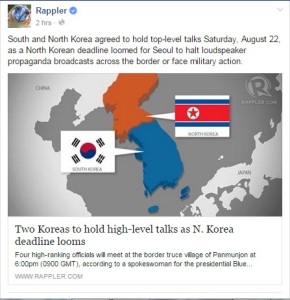
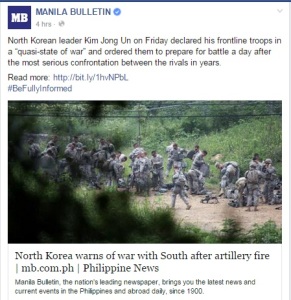
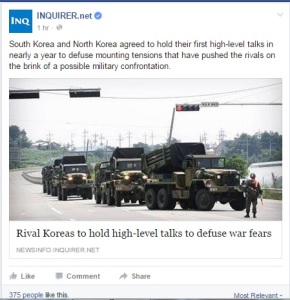
Commentators have a lot of things to say, from mere jokes about the North Korean leader up to the intelligent discussions about both Koreas’ past. As for the commentators from The Manila Bulletin’s page:
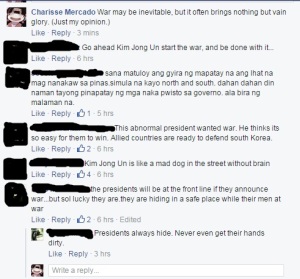
There’s me, commenting about my philosophy about war in light of my semi-pacifist worldview. Some others criticized the North Korean leader Kim Jong Un, thinking that he’s ‘abnormal.’ And there’s someone who made a jest about how the corrupt leaders are.
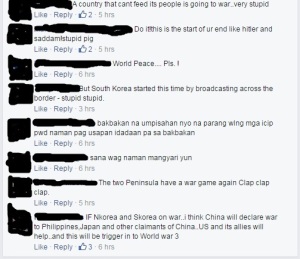
Some people blamed South Korea for choosing to broadcast. Others criticized North Korea for going to war amidst issues of famine in the country. There’s someone who lamented that the two Koreas are at war again. And someone posed the possibility of this issue being the root of the next world war.
Moving on to Rappler:
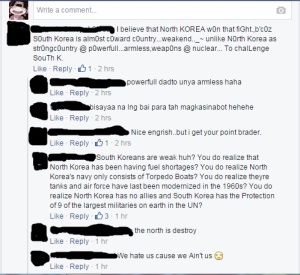
In this part of the discussion, someone who commented in a ‘jeje’ language stated that South Korea is no match for North Korea. However, one debunked this notion through arguments which seem sensible.
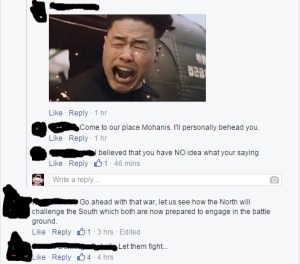
Someone posted a funny photo. And others just wanted them to fight.
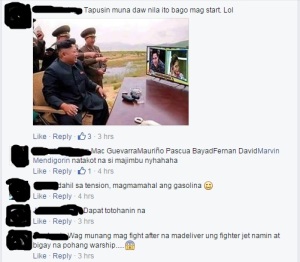
Someone posted an edited photo of Kim Jong Un watching the popular Philippine TV segment on GMA 7. (AlDUB). Another one jokingly compared the NK leader to the iconic antagonist of the Dragon Ball series.

A commentator’s statement at the upper part of the picture is on line with my sentiments. There’s another AlDUB joke. And someone lamented about how NK’s corrupt government is aggravating the people.
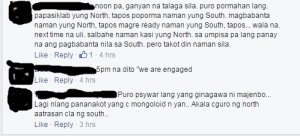
Another commentator expressed criticism about how NK’s has always been like that since time immemorial- threatening SK, SK getting prepared, and NK eventually cancelling the threats. The last person in the discussion during that time period jokingly compared him to that DB antagonist like the other one before and called him ‘mongoloid.’ He also said that it’s not like SK will draw back in fear.
Lastly, the commentators on Inquirer::
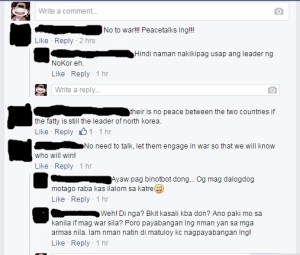
The first person in the forum suggested peace talks instead of war, but someone doubted if the NK leader would ever dare to do that. The next comment called the NK leader ‘fatty’ and said that there will be no peace as long as that leader is still seated in his position.
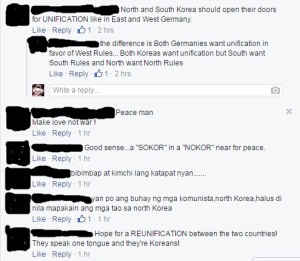
There’s one who suggested that the two Korea’s must reconcile instead like the two Germany’s, but someone said that the two Germany’s only reconciled for the favor of both parties. NK and SK doesn’t want to change their rules, thus division remains among the two. Then, somebody joked about Korean food. And someone criticized the communist government of NK for not being able to feed its people adequately.

Someone feels quite thankful because North Korea is far from the Philippines because he/she stated that NoKor is more aggressive than China. The next person lamented that Inquirer is merely wasting ink on its newspapers because of this news article. The last commentator joked about borrowing missiles from NoKor so we can use them against China.

Someone stated “Let them kill each other.” But another person responded in a rather harsh manner: “Hope the first missile launched hits your house . . . so your kind stops reproducing.” However, the person defended his stance in the last three comments, stating that war is inevitable.
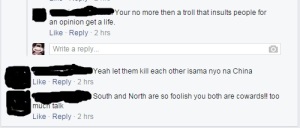
People have varying opinions, and discussions which show the different viewpoints and personalities of the participants are a key to know more about our society. Some of the comments may be racist and unethical in a strict sense, and some may be downright intellectual adding to the discussion some facts about the two countries’ past, but all of them are fun to read because the contrasts make them interesting.
